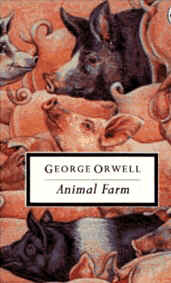 |
|||||
|
Animal Farm |
Animal Farm is easily the most famous work of political allegory ever written. The overworked, mistreated animals take over the running of a farm, and with flamming idealism and stirring slogans, they set out to create a paradise of progress, justice and equality. Everything is wonderful for a while - until the pigs get out of hand. It is a brilliant description of what happens when the revolution goes astray. Allegory is hard to do gracefully, but Orwell manages it superbly: while true appreciation of Animal Farm requires an understanding of the history of the Russian revolution, those without it will still get the point. And Animal Farm can even be appreciated as a story by children with no understanding of the political message at all!
Animal Farm is political satire, most often taken as
a poke at communism, in reality it portrays any totalitarian
system. The whole story is based around the revolution that takes
place at Manor Farm, prompted by Farmer Jones’ ill-treatment
of his animals. The animals are initially portrayed as
essentially stupid, openly exploited by Jones – who carries
off their children and cuts their lives short.
There’s no doubt the pigs get a raw deal on this, Snowball,
the most charismatic and intelligent of the pigs works for the
better of all the animals. Though he is undermined by the cunning
Napoleon and his sidekick Squealer. Seeing Snowball’s
influence spreading Napoleon seeks his own powerbase, recruiting
the dogs, he chases Snowball off the farm – presumably
killed by the dogs.
This puts Napoleon and the rest of the pigs in charge. As the
other animals on the farm work harder than ever, the pigs build
up their power and start to take on the role vacated by Jones.
The hardest workers amongst the animals are the horse, Boxer, and
the donkey, Benjamin. They work day and night, in terrible
conditions for the good of the farm. All the while the pigs start
to morph into the tyrants they supposedly displaced; sleeping in
beds, drinking alcohol, trading with humans and eventually
walking on two legs.
The final element at odds with the animal’s mantra:
“Four legs good, two legs bad”.
However, no matter how bad the conditions get, or how the pigs
change and bend the rules, the animals work on. Boxer and
Benjamin taking the lead. Blind to the exploitation that is
taking place. Even when Boxer is injured the animals believe an
ambulance has come to collect him, but the pigs have sold him to
the slaughterhouse.
Some years later the farm has become very profitable, pig
delegates from other farms come to visit for a special ceremony.
Napoleon unveils the seven commandments of the farm, which have
all been eroded or watered down over time, except the last
“All animals are equal”.
Visiting the scene of the ceremony later, Benjamin looks to the
commandments, and sees finally that they have all been changed,
to suit the pigs, even the last has been added to; “All
animals are equal, but some are more equal than others”. He
goes to the Manor house where he finds the dogs, the pig’s
source of power, drunk at their posts. The pigs are inside, as he
watches through the window they morph into images of Jones.
Benjamin puts out the call to the other animals, and the pigs are
defeated. The ‘workers’ seize control.
So what’s in it for the kids? If you’ve spent some time
radically politicising them they will see the parallels between
the French and Russian Revolutions, possibly the shadows of
totalitarianism of the left and right. More likely they
won’t really get the link, but you may just sprinkle the
seeds of vegetarianism into their lives.
Back to the list of Orwell's Works!
Other links in net: